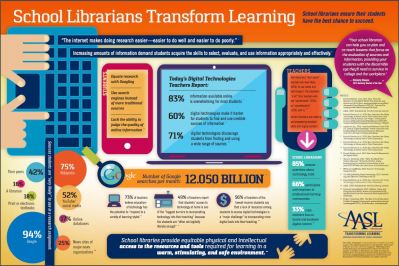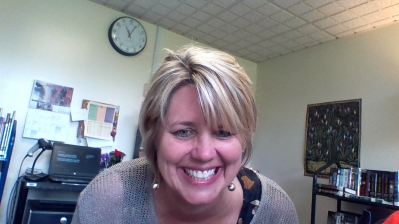Empowering Learning Through Leadership: Program Advocacy
Update December 2020:
This web page is a companion to the 2016 version of the School Library Program Rubric. NYSED released an updated School Library Program Rubric in December 2020.
Student Snapshot: A focus on student achievement guides an advocacy plan that builds support of decision makers who affect the quality of the library media program
According to the American Library Association (n.d.)., “Advocacy is a long-term, deliberate plan that is designed to build stakeholder support. True advocacy is when stakeholders stand up and speak out on behalf of a cause, idea, program or organization. Stakeholder support is built through program design, marketing and education. It is the job of school librarians to design programs around stakeholder needs and to educate stakeholders about how school libraries connect to stakeholders’ priorities. Data and evidence are key educational tools as school librarians work to educate stakeholders about the school library’s role in preparing students to live work and learn in the 21st Century.”
Source: American Library Association. School Library Program Health and Wellness Toolkit. American Library Association.
Citation for infographic: AASL. School Librarians Transform Learning. AASL.
In Practice
Thing 33: Taking the Lead: Connecting with your Stakeholders
Description: This resource provides school librarians with suggestions on how they can develop relationships and partner, to deliver services, with various stakeholder groups in their school community.
Resource/Citation: “Thing 33: Taking the Lead: Connecting with your Stakeholders”. Cool Tools for Schools, 2014.
Four Steps to Self Advocacy
Description: In this blog post, Hannah Byrd Little recommends ways for librarians to self-advocate in order to improve their programs and protect their jobs. She shares ways to advertise library programs, reach out for help, and apply for awards.
Resource/Citation: Little, Hannah Byrd. "Four Steps to Self Advocacy." Knowledge Quest, 7 Oct. 2015.
Parent Advocate Toolkit
Description: This advocacy toolkit provides fundamental information on how to engage parents and families with the school library program. The toolkit includes helpful tips, action plans, documents and guidance on how to ensure that the learning taking place in the library extends to the home.
Resource/Citation: American Association of School Librarians. "Parent Advocate Toolkit." American Association of School Librarians, 2015.
School Library Crisis Toolkit
Description: If you are looking at the AASL School Library Crisis Toolkit, chances are your program is danger of being reduced or eliminated. This kit is designed to assist you as you build meaningful and effective support for saving your program. That means educating and rallying stakeholders to speak out on behalf of school libraries.
Resource/Citation: American Association of School Librarians. "School Library Crisis Toolkit." American Association of School Librarians, 2015.
3.0 Where School is Cool! Frontline Advocacy for School Libraries Toolkit
Description: The purpose of this Where School is Cool! Frontline Advocacy for School Libraries Toolkit is to provide simple tools and strategies for anyone who works for or is passionate about their school library to make advocacy part of their everyday conversation and activities.
Resource/Citation: American Association of School Librarians. "3.0 Where School Is Cool! Frontline Advocacy for School Libraries Toolkit." American Association of School Librarians, 2015.
First Steps with a Library Advisory Committee
Description: The article discusses the implementation of a library advisory committee (LAC) by school librarians. LAC helps in the development of school library program that focus on accomplishing library goals. It also provides support to school leaders, faculty members, and students for personal growth. The author states that library programs are not only for library, but for the whole school.
Resource/Citation: Pickett, Janie. "First Steps with a Library Advisory Committee." Knowledge Quest, vol 42, no. 1, 2013, pp. 14-17.
In Theory
Understanding Advocacy for Effective Action
Description: School librarians are asked to advocate for school libraries, their positions, and their library programs. It is expected that they have knowledge and understanding of advocacy and that activities library professionals have defined as advocacy will be undertaken. However, recent studies show school librarians have different perceptions of advocacy and though the word "advocacy" is widely used, rarely does it carry the same connotation across multiple audiences.
Citation: Burns, Elizabeth A. "Understanding Advocacy For Effective Action." School Library Monthly, vol. 31, no. 7, 2015, pp. 27-29.
Advocacy: The Teacher Librarian as Advocate
Description: The authors detail important information about advocacy, and how the teacher librarian can play the role as an advocate. This article provides insight into planning for advocacy and how to engage with the school community.
Resource/Citation: Johnson, Larry, and Annette Lamb. "Advocacy: The Teacher Librarian as Advocate." The School Library Media Specialist: Program Administration, 2013, http://eduscapes.com/sms/advocacy/advocacy.html.
Expand Access to School Librarians and Libraries
Description: The New York Library Association provides a web briefing on efforts to ensure that all students, K-12, have access to school librarians.
Resource/Citation: New York Library Association. “Expand Access to School Librarians and Libraries”. New York Library Association, 2015.
What is Advocacy?
Description: These definitions for advocacy were developed by the AASL Advocacy Committee.
Resource/Citation: American Association of School Librarians. "What Is Advocacy?" American Association of School Librarians, 2015.
What is Advocacy?
Description: This resource provides a definition on what advocacy is and why school librarians need to advocate.
Resource/Citation: Ohio Educational Library Media Association. "OELMA Advocacy." Ohio Educational Library Media Association, 2014.
Consultant
Name: Sue Kowalski
Email: kowalski423@yahoo.com
Bio: Sue Kowalski is the school librarian at Pine Grove Middle School. She an active leader through NYS and national organizations.
*To access restricted database articles speak with your school librarian or public librarian.







